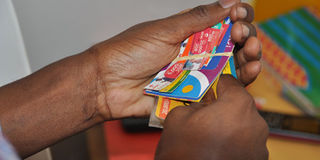Telecoms, UCC discuss fate of airtime scratch cards

After June 30, according to Uganda Communications Commission, the sale of airtime scratch cards will be banned. PHOTO BY ERONIE KAMUKAMA
What you need to know:
Alternatives. Telecoms will after June 30 sell airtime through electronic means such as mobile money and e-airtime vendors, among others.
Telecoms and Uganda Communications Commission are in discussions to decide the fate of airtime scratch cards ahead of the UCC June 30 deadline.
In a March notice, UCC banned the sale of scratch card airtime, which according to the MTN chief marketing officer, Mr Olivier Prentout, they will comply with.
Speaking at a media briefing in Kampala on Monday, Mr Prentout said MTN would be phasing out airtime scratch cards after June 30.
MTN, he said, will instead resort to selling airtime through electronic means such as mobile money and online dealers.
“It is a directive issued by UCC to phase out scratch cards which I believe is a good thing because nobody will be littering pieces of scratch cards,” he said.
However, Mr Prentout could not provide nominal figures of the plausible gain or loss to the telecom ahead of the ban.
Earlier, he had said a number of telecoms still had scratch cards some which were in transit at the time of the ban. He however said that not much would be lost by MTN given that most stock ups had arrived after the announcement of the ban.
In March, UCC banned the sale of scratch cards following a spate of murders and kidnappings that the regulator blamed on unregistered Sim cards and open sale of airtime.
Mr Prentout indicated that telecoms were still in negotiations to see how they will handle scratch cards that are still in circulation after the June 30 deadline.
“This is not completely addressed todate with the regulator [UCC]. I believe it will be phased out periodically. It is still under discussion but I presume they will give it some time to phase out,” he said.
Ms Annie Tabura, the MTN sales and distribution general manager, said electronic airtime will give agents an opportunity to expand their commission income, which unlike scratch cards is much higher.
For selling an airtime scratch card of Shs10,000, an agent is entitled to about Shs300 in commission.
In an email last week, Airtel informed agents that it was realigning commission for online airtime dealers to match mobile money and e-airtime dealers, among others.
For instance, the email indicated, that commission for distributors would drop from 7 per cent to 5 per cent, while retailers would get 4 per cent down from 6 per cent on an airtime transaction.
Ms Faith Bugonzi, the Airtel public relations officer, yesterday told Daily Monitor in a phone interview that they had been encouraging dealers to sell airtime through mobile money ahead of the deadline.
“We are still talking to the regulator [UCC]. There will be several meetings to check what we still have in stock,” she said in reaction to what amount of airtime the company still had in stock.
Daily Monitor could not get a comment from UCC as Mr Godfrey Mutabazi, the regulator’s executive director was held up in a meeting.
Criminal activities.
In a notice issued in March, Uganda Communications Commission banned the sale of airtime scratch cards among other mobile phone related items, arguing that they were being used by criminals to terrorise Ugandans. The ban followed the murder of Susan Magara, who had been kidnapped for almost 27 days.
UCC claimed that criminals were using a lax in the registration of Sim cards and the open selling of airtime to propagate criminality.
A number of Uganda are employed as telecom agents to sell airtime across the country. Many of them have, however, moved to selling airtime through electronic means such as mobile money.
UCC also banned the sale of Sim cards, which has since been lifted, after the regulator announced that government had secured machines that telecoms will use to identify fake notional ID that had been used by suspected criminals to register Sim cards.




